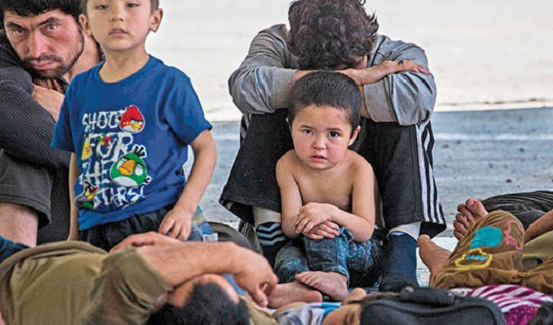World largest economic entities have long been denounced for their deficiency in hosting refugees. With over 65 millions refugee displacement and resettlement across borders in the post-millennium, less than 5% of refugees are hosted by the five largest economic entities, namely US, China, Japan, UK and Germany. Asian affluent countries are especially reluctant to open their borders for refugees, albeit they have continuously signed and ratified resolutions upon humanitarian services for these vulnerable groups. This will be exemplified with China in regard to their refugee-hosting policies.
An overview of Refugee & Migrant in China
UNHCR (2013) Global Report announced, by the end of 2013, that China was hosting 301,000 (ranked 9th in globe) refugees. However, this figure usually presents a falsification if one does not take into account of China’s magnificent 1.4 billions population. Taking a lens of the “number of refugees taken per 1,000 inhabitants”, China merely hosted some 3.5 refugees per 1,000 inhabitants by the end of 2013. Small and developing countries, such as Lebanon and Jordan, in contrast, hosted 177.6 and 88.3 per 1,000 inhabitants respectively at the same year. More ironically, by the end of 2015, China only hosted 9 refugees and 26 asylum seekers from Syria, and another 795 UN-registered “persons of concern”, mainly from the Middle East, on a temporary basis. Taking reference solely from above figures, it is not hard to reckon China, as a superpower in the post-millennium, is unduly passive upon hosting refugees. Precisely speaking, China is deemed as even more passive in taking non-Chinese refugees. In 1979, during the Sino-Vietnamese War, China resettled approximately 300,000 refugees in the southwest China. Coincidently, these refugees are mostly Chinese ethnic origin. Between 1978 and 2004, China also hosted over 283,000 Indo-Chinese refugees. However, in respect of other major refugee crisis, China was almost irresponsive to host any refugees with non-Chinese background, including Rohingya.
China does not practice what they preach
China has loads of “preaches” when it comes to refugee ground. For example, China acceded to the 1951 Convention on the Status of Refugees and the 1967 Protocol; ratified the UN’s Protocol Relating to the Status of Refugees in 1982; engaged in Supporting Syria and the Region Conference, and International Syria Support Group. All these “publicly” assert China’s willingness to support refugee displacement and resettlement. China even donates a significant sum of financial resources to the UNHCR Program per annum. However, China lacks any nationally recognized refugee hosting institutions or other relevant humanitarian aid institutions. Worse still, the UNHCR 2015 Fact Sheet disclosed that China did not provide any assistance to the trivial number of refugees resided in her territories, no matter on a temporary nor permanent basis. Hence, China always speaks loud but acts little for refugees. Not only is she unwilling to host refugees, she is impotent to provide proper facilities for the handful of refugees within her territories.
Reasons for China’s disengagement
It is an open secret that China discourages the acceptance of non-Chinese migrants in regard to her political philiosophy. As a cornerstone of her foreign policies, China would minimize her engagement in foreign chaos or relevant affairs, insofar as possible. For instance, in 2015, Chinese President Xi Jinping launched a $2 billions debt for developing and poor countries. This swiftly rendered a massive scale of domestic resentment. Chinese citizens condemned there are still a noticeably huge number of local citizens living below the poverty line. Therefore, any financial assistance or social welfare should be distributed domestically rather than internationally. Such skepticism demonstrates the dilemma Chinese government is up against if she reallocates national funding to “foreigners”. As a result, although her consistent financial contribution and endorsement to bolster resolving refugee crisis, Chinese government has rarely taken a step further to host refugees, especially those who are not from a Chinese background.
Other countries those are reluctant to host refugees
Similar to China, there are many Arabic countries or rich and developed countries reiterate their unwillingness to host refugees, despite their proximity and rich resources to host these “foreigners” respectively. These include, but not limited to, Saudi Arabia, Qatar, UAE, Japan, Singapore and South Korea. As a Chinese proverb says, “if you want to resolve global challenges, you, at the very first, have to settle your domestic problems”. Perhaps many countries, China alike, have their structural and demographical difficulties within their borders. Therefore, hosting refugees, both temporarily and permanently, is rarely one of their priorities.
Read Relation Between Climate Change & Refugee Crisis

Jason Hung
Research Assistant, University of Warwick, UK
